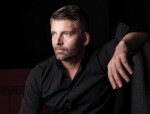Column Name
Title
Composer and conductor Matthias Pintscher’s works have been commissioned and performed all over the world, he’s the music director of the Ensemble Intercontemporain, and starting next season, he’ll be the principal conductor of the Lucerne Festival Academy. He’s also the artist in association with the BBC Scottish Symphony Orchestra and artist in residence with the Danish National Symphony Orchestra. Born in rural Germany, he’s spent a lot of time in England, Israel, and Paris, and has lived in New York City for the past eight years. He made his Juilliard Orchestra conducting debut in 2011 and joined the faculty in 2014. Pintscher studied composition and conducting at London’s Royal College of Music and the conservatories of Detmold and Düsseldorf. Prior to moving to New York, he was a professor at the Hochschule für Musik und Theater in Munich.
Body
How did you become interested in music?
My parents being ardent music lovers as well as amateur players, we played a lot of music at home. I started to learn the piano when I was 5 years old and then fell in love with the violin and started learning it. I played some percussion too. My first and strongest musical impression as a child was listening to Tchaikovsky’s Nutcracker—I was enchanted and transported into a world of sonic imagination. I knew that I was going to be a musician by the time I was 12. That made subsequent decisions a lot easier.
What are three ways your conducting shapes your composing—and vice versa?
All my different activities influence each other mutually: composing, conducting, teaching, curating festivals, etc. In the end, it is all about composing sounds: composing a piece, composing a program, composing a musical environment. It’s a never-ending process of learning. I love being a scholar, gaining insight into how the history of music is connected to what we do nowadays. My conducting is informed by the inner ear of the composer, and my own music would never shape up without the constant feedback I get as an interpreter working with orchestras of different heritages and playing in very different acoustics.
If your students could only remember one thing from your teaching, what would it be?
The goal is not to be remembered for something, it is rather about enhancing the very moment of the encounter itself. Teaching is sharing—on many levels.
What has surprised you most about being at Juilliard?
I am still overwhelmed by the warm welcome of my colleagues in the composition department—I have such wonderful and supportive colleagues. It is something I have never encountered anywhere else. I love them—and my students!
If you weren’t in the career you are in, what would you be doing?
There was never an alternative choice—I am very happy about this.
What are your nonmusic interests or hobbies?
Contemporary art; my dog Yofi, a Magyar Vizsla; cooking; speakeasy tours in N.Y.C. (and elsewhere); and spending time with the people I like and love.
What would people be surprised to know about you?
I don’t eat octopus.
What are you reading/listening to/watching/following these days?
Preparing scores always keeps me busy—I never tire of studying Mahler and Beethoven: [they’re each] a musical cosmos!
Commencement is about endings and beginnings. Do you have any particular advice for your own students or for the ones you’ll be conducting in the commencement concert?
As musicians, we are always “in transit”— every day is a beginning for us. The first word of the Torah/Old Testament is bereshit. [Pintscher conducted the Juilliard Orchestra’s premiere of his work bereshit in 2014.] In Hebrew bereshit means “in a beginning,” and not “in the beginning”—it’s one of many beginnings. This has always fascinated and encouraged me to move forward even sometimes without knowing where the journey will take me. Taking a detour can be very beautiful and rewarding.





